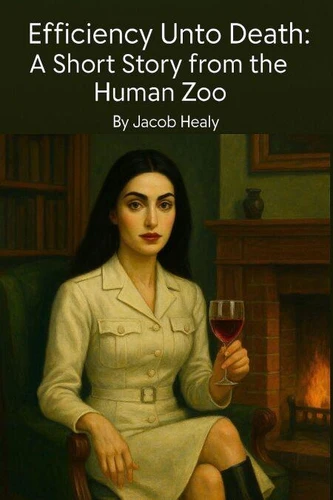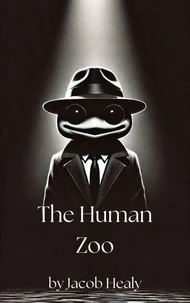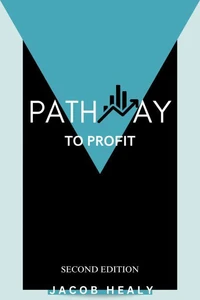Efficiency Unto Death: A Short Story from the Human Zoo. The Human Zoo
Par :Formats :
Disponible dans votre compte client Decitre ou Furet du Nord dès validation de votre commande. Le format ePub est :
- Compatible avec une lecture sur My Vivlio (smartphone, tablette, ordinateur)
- Compatible avec une lecture sur liseuses Vivlio
- Pour les liseuses autres que Vivlio, vous devez utiliser le logiciel Adobe Digital Edition. Non compatible avec la lecture sur les liseuses Kindle, Remarkable et Sony
 , qui est-ce ?
, qui est-ce ?Notre partenaire de plateforme de lecture numérique où vous retrouverez l'ensemble de vos ebooks gratuitement
Pour en savoir plus sur nos ebooks, consultez notre aide en ligne ici
- FormatePub
- ISBN8231979509
- EAN9798231979509
- Date de parution14/07/2025
- Protection num.pas de protection
- Infos supplémentairesepub
- ÉditeurWalzone Press
Résumé
"In the human zoo, the yeast dies when the wine is ready."Enter the sterile theatre of The Human Zoo, where human behavior is observed, cataloged, and quietly dismantled. This is not a tale of monsters or heroes. There are no saviors here. Only a mirror, and the man forced to look into it. Klaus Ritter is an officer, a believer, a man who has modeled his soul around the blueprints of a regime. Efficient.
Disciplined. Obedient. He believes in order, in hierarchy, in the machinery of progress, even when that machinery is built to erase entire peoples. But tonight, a guest arrives. She wears no badge of any known nation. Her uniform bears no name. She does not come to interrogate, to judge, or to rescue. She is something colder. More precise. She is the observer. And her visit will not be forgotten. Over the course of one evening, within a house as sterile as the ideology Ritter serves, the visitor calmly unmasks the soul beneath the system.
Their conversation glides from war crimes to wine to death camps. But each word is a step deeper into an abyss Ritter did not know he stood beside. This is not a horror story. This is documentation. In the style of Black Mirror and The Twilight Zone, Klaus Ritter is a morally unsettling case study wrapped in elegant prose and existential dread. It is a narrative that doesn't shout; rather, it whispers, with the quiet chill of inevitability.
Told through the clinical yet haunting voice of Observer 97115, this entry in The Human Zoo: Volume 2 explores the terrifying logic of obedience, the fragility of conviction, and the poetry of engineered extinction. You will not be asked to pity Klaus Ritter. But you may be asked to consider him. Because the most disturbing truths are not found in what he did, but in how easily he did it.
Disciplined. Obedient. He believes in order, in hierarchy, in the machinery of progress, even when that machinery is built to erase entire peoples. But tonight, a guest arrives. She wears no badge of any known nation. Her uniform bears no name. She does not come to interrogate, to judge, or to rescue. She is something colder. More precise. She is the observer. And her visit will not be forgotten. Over the course of one evening, within a house as sterile as the ideology Ritter serves, the visitor calmly unmasks the soul beneath the system.
Their conversation glides from war crimes to wine to death camps. But each word is a step deeper into an abyss Ritter did not know he stood beside. This is not a horror story. This is documentation. In the style of Black Mirror and The Twilight Zone, Klaus Ritter is a morally unsettling case study wrapped in elegant prose and existential dread. It is a narrative that doesn't shout; rather, it whispers, with the quiet chill of inevitability.
Told through the clinical yet haunting voice of Observer 97115, this entry in The Human Zoo: Volume 2 explores the terrifying logic of obedience, the fragility of conviction, and the poetry of engineered extinction. You will not be asked to pity Klaus Ritter. But you may be asked to consider him. Because the most disturbing truths are not found in what he did, but in how easily he did it.
"In the human zoo, the yeast dies when the wine is ready."Enter the sterile theatre of The Human Zoo, where human behavior is observed, cataloged, and quietly dismantled. This is not a tale of monsters or heroes. There are no saviors here. Only a mirror, and the man forced to look into it. Klaus Ritter is an officer, a believer, a man who has modeled his soul around the blueprints of a regime. Efficient.
Disciplined. Obedient. He believes in order, in hierarchy, in the machinery of progress, even when that machinery is built to erase entire peoples. But tonight, a guest arrives. She wears no badge of any known nation. Her uniform bears no name. She does not come to interrogate, to judge, or to rescue. She is something colder. More precise. She is the observer. And her visit will not be forgotten. Over the course of one evening, within a house as sterile as the ideology Ritter serves, the visitor calmly unmasks the soul beneath the system.
Their conversation glides from war crimes to wine to death camps. But each word is a step deeper into an abyss Ritter did not know he stood beside. This is not a horror story. This is documentation. In the style of Black Mirror and The Twilight Zone, Klaus Ritter is a morally unsettling case study wrapped in elegant prose and existential dread. It is a narrative that doesn't shout; rather, it whispers, with the quiet chill of inevitability.
Told through the clinical yet haunting voice of Observer 97115, this entry in The Human Zoo: Volume 2 explores the terrifying logic of obedience, the fragility of conviction, and the poetry of engineered extinction. You will not be asked to pity Klaus Ritter. But you may be asked to consider him. Because the most disturbing truths are not found in what he did, but in how easily he did it.
Disciplined. Obedient. He believes in order, in hierarchy, in the machinery of progress, even when that machinery is built to erase entire peoples. But tonight, a guest arrives. She wears no badge of any known nation. Her uniform bears no name. She does not come to interrogate, to judge, or to rescue. She is something colder. More precise. She is the observer. And her visit will not be forgotten. Over the course of one evening, within a house as sterile as the ideology Ritter serves, the visitor calmly unmasks the soul beneath the system.
Their conversation glides from war crimes to wine to death camps. But each word is a step deeper into an abyss Ritter did not know he stood beside. This is not a horror story. This is documentation. In the style of Black Mirror and The Twilight Zone, Klaus Ritter is a morally unsettling case study wrapped in elegant prose and existential dread. It is a narrative that doesn't shout; rather, it whispers, with the quiet chill of inevitability.
Told through the clinical yet haunting voice of Observer 97115, this entry in The Human Zoo: Volume 2 explores the terrifying logic of obedience, the fragility of conviction, and the poetry of engineered extinction. You will not be asked to pity Klaus Ritter. But you may be asked to consider him. Because the most disturbing truths are not found in what he did, but in how easily he did it.









